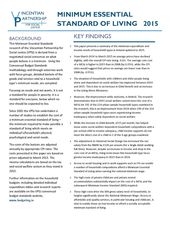2015 MESL Update Report
Issued: May 2015
Summary
This paper presents a summary of the minimum expenditure and income needs of household types in Ireland updated to 2015.
- From March 2014 to March 2015 on average prices have declined slightly, with the overall CPI rate being -0.6%. The average core cost of a MESL is higher in 2015 than in 2008 (by 0.35%), while the CPI rates would suggest that prices on average are lower now than in 2008 (by -0.55%).
- The situation of households with children and older people living alone and dependent on social welfare has improved between 2014 and 2015. This is due to an increase in Child Benefit and an increase in the Living Alone Allowance.
- However, this improvement while welcome, is limited. The research demonstrates that in 2015 social welfare cannot meet the cost of a MESL for 191 of the 214 urban sample household types examined in the research, this is an improvement from 2014 when 199 of the 214 urban sample household types were experiencing income inadequacy when solely dependent on social welfare.
- While the increase to Child Benefit, of €5 per month, has helped move some social welfare dependent household compositions with a pre-school child to income adequacy, child income supports do not meet the direct cost of a child in 3 of the 4 age groups examined.
- The adjustment to Universal Social Charge has increased the net salary from the NMW by €124 per annum (for a Single Adult working full-time). However, despite an increase in income and drop in the core cost of an MESL, rising rents mean this household type faces greater income inadequacy in 2015 than in 2014.
- Access to social housing and in-work supports such as FIS can enable a number of household compositions afford a Minimum Essential Standard of Living when earning the national minimum wage.
- The high costs of private childcare and private rented accommodation substantially impact on the cost of a MESL and the subsequent Minimum Income Standard (MIS) required.
- These high costs drive the MIS gross salary need of households, to heights significantly above the National Minimum Wage. Access to affordable and quality services, in particular housing and childcare, is vital to enable those on low income to afford a socially acceptable minimum standard of living.
